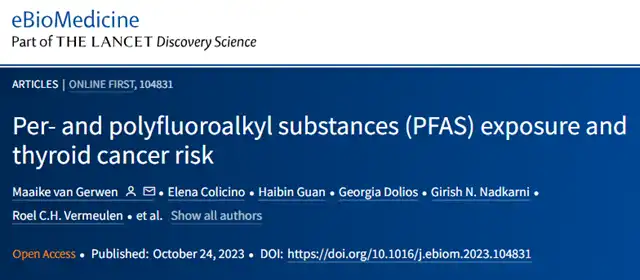PFAS in Non-stick Cookware and Cosmetics Linked to Thyroid Cancer
- Normal Liver Cells Found to Promote Cancer Metastasis to the Liver
- Nearly 80% Complete Remission: Breakthrough in ADC Anti-Tumor Treatment
- Vaccination Against Common Diseases May Prevent Dementia!
- New Alzheimer’s Disease (AD) Diagnosis and Staging Criteria
- Breakthrough in Alzheimer’s Disease: New Nasal Spray Halts Cognitive Decline by Targeting Toxic Protein
- Can the Tap Water at the Paris Olympics be Drunk Directly?
PFAS in Non-stick Cookware and Cosmetics Linked to Thyroid Cancer
- Should China be held legally responsible for the US’s $18 trillion COVID losses?
- CT Radiation Exposure Linked to Blood Cancer in Children and Adolescents
- FDA has mandated a top-level black box warning for all marketed CAR-T therapies
- Can people with high blood pressure eat peanuts?
- What is the difference between dopamine and dobutamine?
- How long can the patient live after heart stent surgery?
PFAS in Non-stick Cookware and Cosmetics Linked to Thyroid Cancer
PFAS, known as per- and polyfluoroalkyl substances, are often referred to as “forever chemicals” due to their unique chemical properties. They are commonly used in the manufacturing of cosmetics, non-stick cookware, waterproof gear, and firefighting foams.
These substances pose a potential threat to human health and the environment. Some studies have suggested that exposure to high levels of PFAS may have adverse effects on the liver, immune system, and could be associated with certain cancers, reproductive issues, and developmental problems.
Over the past few decades, there has been a significant increase in thyroid cancer worldwide. Between 1974 and 2013, the incidence of thyroid cancer in the United States increased by an average of 3.6% per year, with similar trends observed in China.
On October 24, 2023, researchers from the Icahn School of Medicine at Mount Sinai in the United States published a study titled “Per- and polyfluoroalkyl substances (PFAS) exposure and thyroid cancer risk” in the journal “eBioMedicine.”
The study revealed a correlation between PFAS found in non-stick cookware and cosmetics and an increased risk of thyroid cancer. For every increase of one quartile in the concentration of linear perfluorooctane sulfonic acid (n-PFOS), the diagnosis rate of thyroid cancer increased by 56%.

In this study, researchers analyzed data from a biobank associated with medical records at the Icahn School of Medicine at Mount Sinai, which included 88 thyroid cancer patients and 88 non-cancer control subjects. Plasma samples were collected from these patients before or at the time of diagnosis, and the association between plasma PFAS levels and thyroid cancer diagnosis was analyzed.
Using liquid chromatography-high-resolution mass spectrometry and suspect screening non-targeted analysis, researchers measured eight plasma PFAS and compared the differences in PFAS levels between participants with thyroid cancer and healthy participants.
The results showed a 56% increase in the diagnosis rate of thyroid cancer for every increase of one quartile in the concentration of linear perfluorooctane sulfonic acid (n-PFOS). This positive correlation between n-PFOS and thyroid cancer diagnosis remained consistent after adjusting for all other seven PFAS in the continuous model.
Additionally, the researchers analyzed plasma PFAS levels in 74 patients with papillary thyroid cancer and found similar results. For every increase of one quartile in the concentration of linear perfluorooctane sulfonic acid, the diagnosis rate of papillary thyroid cancer increased by 56%.
Furthermore, further analysis was conducted on 31 patients who had been diagnosed with thyroid cancer at least one year after joining the cohort to consider the time interval between exposure to PFAS chemicals and the onset of the disease.
Further analysis revealed a significant association between linear perfluorooctane sulfonic acid concentration and thyroid cancer diagnosis, as well as significant correlations with Sb-PFOS, PFNA, PFOPA, and n-PFHxS.
The researchers stated that these findings further confirm the health hazards of PFAS. Given that it is nearly impossible to avoid PFAS in our daily lives, they hope that these findings will raise awareness of the seriousness of these persistent chemicals and that one day, exposure to PFAS can be avoided.
It is worth noting that previously, researchers from the Icahn School of Medicine at Mount Sinai and Harvard University published a study titled “Exposure to perfluoroalkyl substances and women’s fertility outcomes in a Singaporean population-based preconception cohort” in the journal “Science of the Total Environment.”
The study found that PFAS may reduce women’s fertility by up to 40%, indicating a link between PFAS exposure and decreased female fertility and fecundability.

PFAS in Non-stick Cookware and Cosmetics Linked to Thyroid Cancer
Paper link:
https://doi.org/10.1016/j.ebiom.2023.104831
https://doi.org/10.1016/j.scitotenv.2023.162267
(source:internet, reference only)
Disclaimer of medicaltrend.org
Important Note: The information provided is for informational purposes only and should not be considered as medical advice.



